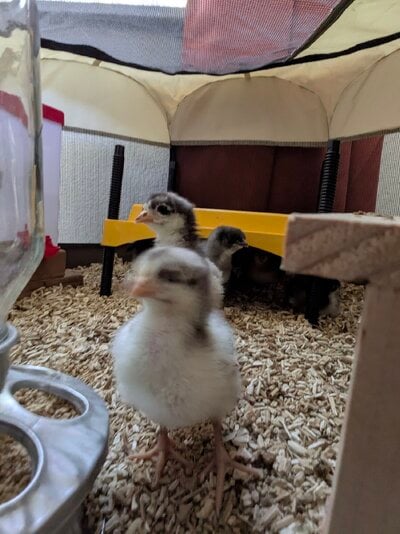Hello! I'm a first time chicken mama, and am just trying to understand, set my chicks up for healthy lives, and be prepared in case of illness.
My chicks are almost 2 weeks old. They were not vaccinated, and I have been giving them medicated feed from day one at the recommendation of the store where I bought them. I have heard a few people say they put dirt from the coop area into the brooder to help expose them to the cocci before sticking them outside without the medicated feed.
At 2 weeks, is it too late to start the dirt clump exposure? For 7 chicks, how much dirt and how often do I give it to them? If I give them dirt, do I need to also start offering grit? If I see signs of cocci, how do I determine dosage of corid?
Also, on the bag of medicated feed it says "do not change litter while using medicated food unless absolutely necessary." I've scooped it out a few times, but haven't done a full clean/replace. Is this really how it's done? Leave most of the bedding to keep the medication in their system?
Thanks so much, I am hoping I don't have to worry too much about it, but just want to get all my ducks (or chicks!) in a row just in case!!
Here are a couple of pics of my ladies too, because they're so dang cute!
My chicks are almost 2 weeks old. They were not vaccinated, and I have been giving them medicated feed from day one at the recommendation of the store where I bought them. I have heard a few people say they put dirt from the coop area into the brooder to help expose them to the cocci before sticking them outside without the medicated feed.
At 2 weeks, is it too late to start the dirt clump exposure? For 7 chicks, how much dirt and how often do I give it to them? If I give them dirt, do I need to also start offering grit? If I see signs of cocci, how do I determine dosage of corid?
Also, on the bag of medicated feed it says "do not change litter while using medicated food unless absolutely necessary." I've scooped it out a few times, but haven't done a full clean/replace. Is this really how it's done? Leave most of the bedding to keep the medication in their system?
Thanks so much, I am hoping I don't have to worry too much about it, but just want to get all my ducks (or chicks!) in a row just in case!!
Here are a couple of pics of my ladies too, because they're so dang cute!






